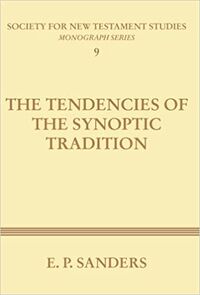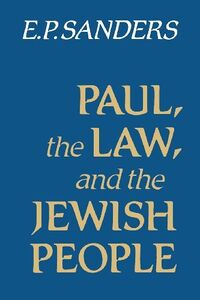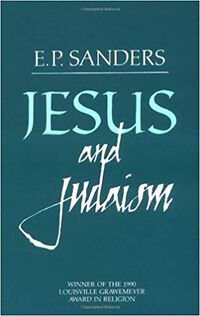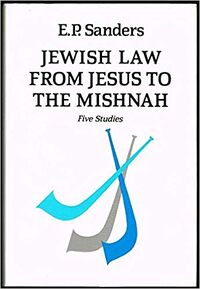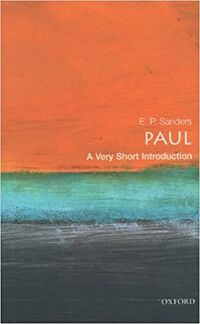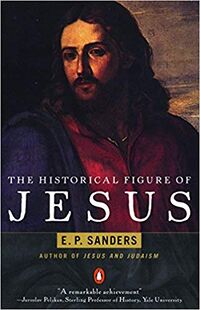Ed Parish Sanders (M / United States, 1937), scholar
Ed Parish Sanders (b.1937) is an American scholar. Professor emeritus at Duke University (Durham, NC). Born in Grand Prairie, Texas into a family of modest means. BA 1959 (Texas Wesleyan College). MA 1962 (Southern Methodist University). ThD 1966 (Union Theological Seminary). Studied modern Hebrew and Rabbinics in Israel. Professor at McMaster University, Canada (1966-1984), and at the University of Oxford, England (1984-1990). Arts and Sciences Professor of Religion at Duke University (1990-2005).
-- 1960s --
E.P. Sanders, The Tendencies of the Synoptic Tradition (Society for New Testament Studies Monograph Series, 9; London [England]: Cambridge University Press, 1969)
- The Synoptic Gospels contain traditions about Jesus which differ in some respects from Gospel to Gospel and, it is presumed, from the very earliest Christian traditions. Scholars often seek to establish the earliest form of each tradition and the methods and criteria they use are of the greatest importance. Dr Sanders here provides a reassessment of this whole problem. His study deals directly with the question of determining the reliability of the Synoptic Gospels.--Publisher description.
-- 1970s --
E.P.Sanders, Paul and Palestinian Judaism (Philadelphia, PA: Fortress; and London: SCM Press, 1977)
- Paul and Palestinian Judaism compares Judaism, understood on its own terms, with Paul, understood on his own terms. Sanders aims to: Consider methodologically how to compare two (or more) related but different religions destroy the view of Rabinic Judaism which is still prevalent in much, perhaps most, New Testament scholarship establish a different view of Rabbinic Judaism argue a case concerning Palestinian Judaism as a whole argue for a certain understanding of Paul carry out a comparison of Paul and Palestinian JudaismThis volume makes a contribution not only to the understanding of Paul and his relationship to Judaism, but also to the study of Judaism itself.--Publisher description.
- In this work Sanders seeks to compare, methodologically, two different systems of religion— namely Palestinian Judaism and Paul— on their own terms. His approach is to analyze the surviving literature for each respective religious system, draw conclusions based on a close reading of that literature, and then compare the two with one another. Throughout the comparative study, Sanders first debunks the predominant opinion of New Testament Scholars of his day that Judaism at the time of Jesus had degraded to a legalistic form of works-righteousness, and proposes instead, that Palestinian Judaism from 200 B.C.E. to 200 A.D. can be understand as “Covenantal Nomism.” After establishing this perspective, Sanders turns to Paul’s religious system and shows that, despite there being several points of convergence between Paul and Palestinian Judaism, since Paul denies the efficacy of the Jewish covenant for salvation he in essence rejects Covenantal Nomism. Thus Sanders concludes that Paul represents an entirely different form of religion that does not have a clear antecedent, but rather is a system that is focused on the meaning of the life and death of Jesus Christ. – Deborah Forger, University of Michigan
- Paulus und das palästinische Judentum (1985 Sanders), book (German ed.)
- Paolo e il giudaismo palestinese (1986 Sanders), book (Italian ed.)
-- 1980s --
E.P. Sanders, Paul, the Law, and the Jewish People (Philadelphia, PA: Fortress, 1983)
- This book is devoted both to the problem of Paul's view of the law as a whole, and to his thought about and relation to his fellow Jews. Building upon his previous study, the critically acclaimed Paul and Palestinian Judaism, E.P. Sanders explores Paul's Jewishness by concentrating on his overall relationship to Jewish tradition and thought. Sanders addresses such topics as Paul's use of scripture, the degree to which he was a practicing Jew during his career as apostle to the Gentiles, and his thoughts about his "kin by race" who did not accept Jesus as the messiah. In short, Paul's thoughts about the law and his own people are re-examined with new awareness and great care. Sanders addresses an important chapter in the history of the emergence of Christianity. Paul's role in that development -- specially in light of Galatians and Romans -- is now re-evaluated in a major way. This book is in fact a significant contribution to the study of the emergent normative self-definition in Judaism and Christianity during the first centuries of the common era.--Publisher description.
E.P. Sanders, Jesus and Judaism (1985 Sanders), book
- Gesù e il giudaismo = Jesus and Judaism (1992 Sanders / Stefani), book (Italian ed.)
- 예수와유대교 = Jesus and Judaism (1998 Sanders / Hwang), book (Korean ed.)
- Jesús y el judaísmo (2004 Sanders), book (Spanish ed.)
-- 1990s --
- The Historical Figure of Jesus (1993 Sanders), book
- Gesù: la verità storica = The Historical Figure of Jesus (1995 Sanders / Sampaolo), book (Italian ed.)
- Sohn Gottes: eine historische Biographie Jesu = The Historical Figure of Jesus (1996 Sanders / Enderwitz), book (German ed.)
- La figura histórica de Jesús = The Historical Figure of Jesus (2000 Sanders / Tosaus), book (Spanish ed.)

